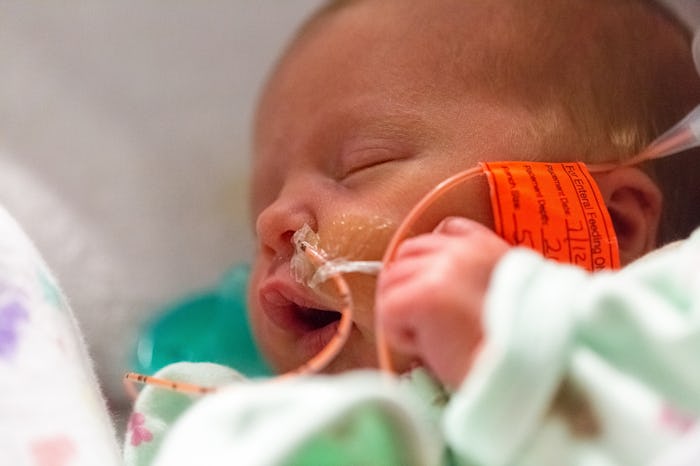NICU

Breastfeeding In The NICU Is Not Impossible, But A *Real* Challenge
It’s going to take some work.
Having a baby in the neonatal intensive care unit (NICU) is obviously super stressful. No parent imagines that their baby is going to be whisked away from them just after being born, and it can be a truly heartbreaking situation. It can also throw a wrench into your plans for breastfeeding, because you can’t nurse a baby on demand when they’re not by your side 24/7. But that doesn’t mean you have to totally give up your breastfeeding intention. If you’ve ever wondered, “Can I breastfeed in the NICU?”, the answer is yes — but it’s going to take more effort than usual.
While making it work can be challenging, the littlest NICU babies can really benefit from breastfeeding. “Preemies are much more at risk of infections, one in particular that we call NEC, which stands for necrotizing enterocolitis,” Dr. Marianne Garland, M.D., medical director of the NICU Lactation Program and Donor Human Milk Program at New York-Presbyterian Morgan Stanley Children's Hospital, tells Romper. “The disease is about as bad as the name suggests, and the only thing shown to prevent or reduce the risk of it is mother’s milk.”
NEC is “a disease of the intestines that we see primarily in premature infants and infants with underlying health issues,” Demi Lucas, senior patient care coordinator and IBCLC at the Lactation Network, tells Romper. “The word ‘necrotizing’ is the process of tissue death, and the word ‘enterocolitis’ is defined as inflammation of areas in the intestine [or] colon. It occurs in babies in their first weeks and months of life and causes an inflammation that can lead to intestinal tissue or colon damage.” The condition affects around 9,000 infants in the U.S. every year and remains a leading cause of infant mortality. While breastfeeding doesn’t eliminate the chances that a baby will develop NEC, it can be a helpful protective mechanism.
Barriers To Breastfeeding A NICU Baby
As much as breastmilk can benefit them, some NICU babies just won’t be able to nurse right away. “Infants less than 32 to 33 weeks gestation are usually not placed to breast for their feedings because they are not developmentally ready to feed by mouth,” explains Ashley Harper, a registered nurse (RN) in the NICU at Forrest General Hospital in Hattiesburg, MS. “With these infants, we will place a feeding tube and feed the infant their mothers’ breast milk through the feeding tube.”
Even babies who are born full-term can struggle with figuring out the suck-swallow-breath mechanics of breastfeeding. And of course, those parents whose NICU babies take to nursing right away will still need a back-up feeding plan, because not many NICU facilities allow to you stay with your baby 24 hours a day. In these situations, the parent may end up spending lots of time hooked up to a breast pump, unfortunately.
How Often To Breastfeed & Pump With A NICU Baby
You’ll need to pump pretty much around the clock to make sure you get off to a good start. “Normally a baby is feeding from the breast maybe 12 times a day,” Garland says. “So, when we ask [moms] to pump eight times a day, it’s certainly not as many times a day as a baby is feeding, but most of them pump three to five times a day, and that’s not enough for them to really establish a good milk supply.” Harper agrees that the more you can pump, the better: “If you only pump twice a day, then your body is going to think it does not need to produce as much milk.”
How To Breastfeed In The NICU
Once Baby is ready, you can usually still practice breastfeeding from the breast (as long as your medical team is OK with it), and get in lots of snuggle time with your newborn. “We try and have the moms do a lot of skin-to-skin holding, so they get comfortable holding their babies,” Garland says. “Then they can begin to recognize feeding cues from the baby. That way they can do some [of] what we call non-nutritive latching, where the baby can practice trying to latch on.”
Most NICUs have plenty of support staff on hand to help you make the transition from pumping to nursing full-time, so don’t hesitate to ask for assistance. Garland says you shouldn’t be too hard on yourself if you’re struggling. “Realize that this is going to take time,” she says. “The baby’s learning, she’s learning. As the baby matures, they’re going to get stronger and be able to do better… Being prepared and having confidence in yourself are really the keys to being successful.”
Breastfeeding a NICU baby is totally doable, but it’s also super hard work. Harper reminds you not to neglect yourself in the process: “Our breastfeeding mothers need to sleep, eat, hydrate, and destress.” If you can do all those things and still manage to pump or nurse when your baby needs it, your odds of achieving the breastfeeding relationship you want are strong. And try not to be too hard on yourself — you’re not going to have it figured out right away (no one does!), but you can still start setting your baby up for success.
Studies referenced:
Ginglen JG, Butki N. Necrotizing Enterocolitis. [Updated 2021 Aug 13]. In: StatPearls [Internet]. Treasure Island (FL): StatPearls Publishing; 2021 Jan-. Available from: https://www.ncbi.nlm.nih.gov/books/NBK513357/
Experts:
Dr. Marianne Garland, M.D., Medical Director of the NICU Lactation Program and Donor Human Milk Program at New York-Presbyterian Morgan Stanley Children's Hospital
Ashley Harper, Registered Nurse (RN) in the NICU at Forrest General Hospital
This article was originally published on